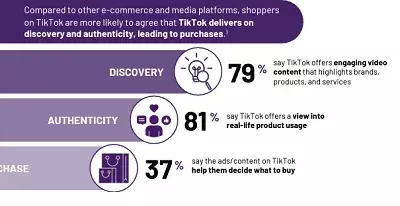TikTok has become a household name across the globe, particularly in the United States, where its influence stretches far beyond entertainment. As the app faces potential removal from the U.S. market, a recent survey conducted by TikTok in collaboration with Ipsos offers a unique perspective on its role as a product discovery and shopping tool. This analysis raises significant questions about TikTok’s future and its importance to retailers yearning for new avenues to reach consumers in an increasingly competitive landscape. The survey, which encompassed 3,876 U.S. internet users, serves as a pivotal moment to evaluate TikTok’s evolving eCommerce features and the potential implications for retailers navigating an uncertain digital shopping arena.
The report reveals that TikTok provides considerable value as a product discovery platform. Central to this are the creators who engage users and cultivate interests in various products. TikTok’s algorithm harnesses data to feature trending products closely aligned with user preferences, thereby facilitating a more personalized shopping experience. This highlights the app’s unique selling proposition when compared to traditional eCommerce platforms, which often rely on generic advertising strategies. As user engagement turns toward product exploration and acquisition, this trend signals a noteworthy shift in consumer behavior. Users are progressively relying on TikTok not merely for entertainment but as a vital source of purchasing inspiration and decision-making.
Influencer marketing remains one of TikTok’s most powerful assets. With a vast network of creators influencing purchasing habits, TikTok thrives on authenticity rarely found on other platforms. As users increasingly lean towards purchasing items showcased by their favorite creators, the marketing landscape shifts dramatically. This trend is reflected in the report’s findings that demonstrate a growing comfort with purchasing directly through TikTok. It showcases how user-generated content can yield high engagement levels, surpassing the effectiveness of traditional advertisements. As shoppers engage with curated content, the social proof of purchases made by peers enhances the perception of the quality and desirability of the products being displayed.
One of the noteworthy components of the TikTok report is the comparative analysis of sentiment regarding various commerce platforms. TikTok’s distinct approach allows for a more holistic experience, blending entertainment with shopping. The survey indicates that consumers find TikTok to be a fresher platform for discovering new products, contrasting sharply with more established eCommerce giants that may lack the social interactivity and entertainment components that TikTok seamlessly integrates. Such differentiation underscores the integral role that TikTok could play in redefining online shopping for a generation increasingly influenced by social trends.
If TikTok manages to navigate the political and legal challenges it faces and continues to operate in the U.S., the insights gathered in this report present actionable strategies for retailers. Businesses can harness the platform’s unique features to engage with customers on a different level – one that prioritizes relatability and engagement over traditional marketing. By collaborating with influential creators, brands can tap into pre-existing communities and leverage the viral nature of content to drive sales. The report emphasizes the need for retailers to rethink their approach to eCommerce by embracing these novel ways of interacting with consumers, thereby maximizing brand visibility and connection.
Against this backdrop of growing momentum in eCommerce, the impending threat of removal from the U.S. market looms large. The U.S. government’s push for a sale of TikTok raises questions about the viability of these emerging shopping features if the app ceases to exist in its current form. With discussions around forced sell-offs and governmental pressures, many steps remain uncertain. However, should TikTok be granted a reprieve, the insights shared in this report could provide invaluable guidance for retailers looking to capitalize on the platform’s innovative approach to shopping and consumer engagement.
TikTok stands at a crossroads. While the shopping functionalities are still developing, the report sheds light on the platform’s potential to reshape online shopping experiences in meaningful ways. As the future remains unwritten, both TikTok and retailers must navigate through these challenges and opportunities to harness the full power of this social commerce revolution.


Leave a Reply